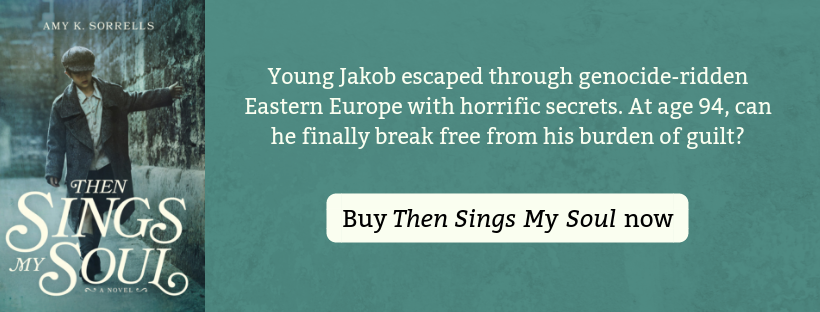In Then Sings My Soul by Amy K. Sorrells, time is running out for elderly Jakob, who as a boy survived escape through genocide-ridden Eastern Europe, to be free from his burden of guilt. In the piece below, read what Amy wrote about inspiration behind the novel.
The stale smell of urine choked us when my fellow nurse and I entered the old woman’s room in the emergency department. All angles and edges beneath the white sheet, the patient moaned when she inhaled and sighed when she exhaled, her chest bones like a rusty metal cage scraping the sides of tender lungs.
“Where is her family?” someone asked.
“None listed,” said the EMT who’d brought her in from the nursing home.
Helping her breathe became our focus. We turned her as easy as we could from her side, gasping at the open wound at the base of her spine. We tried in vain to flatten her contorted, contracted back against the inflexible foam gurney. As best as we could, we stretched out hips and knees kinked stubborn into a pretzeled pile of pain. I wondered how we would ever straighten her enough to sandwich her between the ramrod, unforgiving plates of film.
Burning anxiety—the kind a nurse feels when she knows the pain about to come to a person—crept up my chest and into my throat. I clutched her hand, ropy with blue veins, and moved closer to her, close enough to see the flecks of green and gray in her blue eyes, blue eyes I imagined once loved well by a man or a toddler reaching up to her from his crib, blue eyes I imagined dancing with daffodils on a spring day when her legs were all flesh and freedom.

She looked back at me, brow furrowed with the question of pain and the exhaustion of living.
“We have to move you a little to get this X-ray,” I said. “But I’m gonna try as hard as I can not to hurt you.”
“No one . . . has ever . . . said that . . . to me before,” she said between gasps for breath.
Tears puddled in her baggy bottom eyelids.
I turned away as tears puddled in my own, as well.
We were able to get the X-ray, although not without causing her some pain despite how gentle we tried to be, along with the many pillows we stuffed between her bones and the cold, hard steel of the table.
And although I knew she hurt in that moment, I couldn’t help but think about the pain she felt that must have been worse: the pain of being alone and of not mattering.
The pain of being helpless and fragile, and of others not being careful with you.
The pain of having once been virile and beautiful and noticed, but now unable to flow along with life’s crowded, unforgiving current.

This patient is just one of hundreds I have had the privilege of caring for over my 25 years as a registered nurse. As a writer whose overarching mission is to write stories of hope about the hurting and marginalized, it might come as no surprise that patients like her are one of the primary inspirations of my novel Then Sings My Soul. Over and over again in my nursing work, I caught myself thinking somehow the elderly were different—even unrelatable—because of their sagging skin and rheumy eyes, their slowness of step and speech. Over and over again, I discovered that these broken, lonely, and aged patients had remarkable, irreplaceable life stories. Over and over again, I discovered how much they mattered, and that by dismissing their stories we dismiss a part of ourselves, as Jakob’s daughter Nel learns in my novel.
While a 94-year-old protagonist like Jakob might not seem intriguing at first glance, I hope readers will learn as I have that even—perhaps especially—the most insignificant-seeming life can make the biggest difference. More than that, I hope readers will discover that the deep and multifaceted mystery of every individual matters.
Then Sings My Soul by Amy K. Sorrells
1904, Chudniv, Ukraine. Playing hide-and-seek in bucolic fields of sunflowers, young Jakob never imagines the horrific secrets he will carry as he and his brother escape through genocide-ridden Eastern Europe.
1994, South Haven, Michigan. At age 94, time is running out for any hope that Jakob can be free from his burden of guilt.
When Jakob’s wife dies, he and his daughter, Nel, are forced to face the realities of his worsening dementia—including a near-naked, midnight jaunt down the middle of main street—as well as emerging shadows Nel had no idea lay beneath her father’s beloved, curmudgeonly ways.
While Nel navigates the restoration and sale of Jakob’s dilapidated lake house, her high school sweetheart shows up in town, along with unexpected correspondence from Ukraine. And when she discovers a mysterious gemstone in Jakob’s old lapidary room, Jakob’s condition worsens as he begins having flashbacks about his baby sister from nearly a century past.
As father and daughter race against time to discover the truth behind Jackob’s fragmented memories, the God they have both been running from shows that he redeems not only broken years, but also the future.



